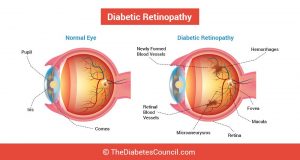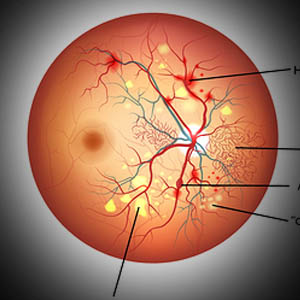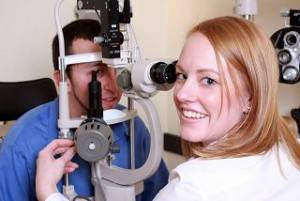By Elisabeth Almekinder RN, BA, CDE
 Blurred vision can often be one of the first warning signs of diabetes. Many people who are newly diagnosed end up visiting their primary care providers after a diagnosis during an annual eye exam with an optometrist, and usually as a result of a specific eye condition.
Blurred vision can often be one of the first warning signs of diabetes. Many people who are newly diagnosed end up visiting their primary care providers after a diagnosis during an annual eye exam with an optometrist, and usually as a result of a specific eye condition.
Before we continue with this article, I wanted to let you know we have researched and compiled science-backed ways to stick to your diet and reverse your diabetes. Want to check out our insights? Download our free PDF Guide “Power Foods to Eat” here.
Many times, patients are unable to obtain a vision prescription until they get their blood sugars down. Once their diabetes is treated and their blood sugars aren’t elevated, they can be better evaluated for the pair of glasses closest to their accurate vision test.
In the article below, we will look at why blurred vision is an important warning sign that you may have diabetes in some cases. We will also look at the other causes of blurry vision, some of the treatments for them, and why seeing a vision provider when you have changes in your vision could be the difference between preserving or losing sight in some cases, such as with glaucoma, retinal detachment or macular degeneration.
Kelly’s Eyes
 You may recall stories of my best friend in high school, Kelly, who had T1D, at the time called “juvenile diabetes.” By the time she was 46, Kelly had developed some of the common complications that come with diabetes. She had had a stroke, and as a result, she was declared legally blind.
You may recall stories of my best friend in high school, Kelly, who had T1D, at the time called “juvenile diabetes.” By the time she was 46, Kelly had developed some of the common complications that come with diabetes. She had had a stroke, and as a result, she was declared legally blind.
She never revealed to me what the diagnosis was related to her vision the few times I saw her around that time.
She didn’t want to talk about her diabetes, but rather what had been going on in her life over the past five years. After all, diabetes was secondary. Kelly had a vibrant and bright social life, filled with many people who loved her company.
In other words, she was Kelly first, and she was a person with diabetes second.
Although I didn’t pry on that trip where we went out for dinner and a show which included lots of hellos from people I hadn’t seen in 20 years or more, it was clear that diabetes had taken its toll on Kelly, and on her vision. She didn’t focus on you or look at you because she was no longer able to see anything but shadows and lights. Something that I found out later from her sister.
Unfortunately, we lost Kelly two years later due to another stroke. She lived in a time when people with diabetes did not have the appropriate resources to effectively control it the way that they can now. Many complications and devastating health issues that affect the quality of life can be prevented.
For your sight, your overall health, and your life learn to control your diabetes. Diabetes is a true threat to your health, and to your vision which allows you to see the world around you.
What Are The Causes Of Blurred Vision?
There are many other causes of blurred vision aside from the low and high blood sugars of diabetes. Having blurry vision means that you don’t see the details and you lose the sharpness of your vision.
From ages 25 to 75, diabetes is the No. 1 cause of blindness, but there are other vision problems that can cause difficulty as well. Blurred vision can be caused by a whole host of conditions besides diabetes. The following are some of the conditions that may cause vision to blur:
- Having the wrong prescription for corrective lenses, or not wearing eyeglasses or contacts when needed
- Macular degeneration (usually related to age)
- Retinal detachment where the retina and the blood vessels in it pull away from the back of the eye, causing severe pain and loss of vision
- Glaucoma (all types)
- Cataracts that cloud the lens
- Dry eye
- Conjunctivitis, also known as pink eye (inflammation of the conjunctiva in the eye)
- Medications, including antidepressants, some cardiovascular medications, and steroids (cortisone)
- Stroke or TIA (Transient Ischemic Attack)
- Migraine headaches
- Eyestrain from overuse of computers and electronic devices (cell phones, tablets, notebooks, computers, televisions)
- Multiple Sclerosis (MS)
- Lupus
- High blood pressure
- Nearsightedness
- Farsightedness
How Does Diabetes Cause Blurry Vision?
 When the lens that you use to focus on objects with your eyes becomes swollen from high blood sugars, as in diabetes, they change shape causing varying degrees of vision loss. You may have noticed your vision changing from blurred to clearer over time.
When the lens that you use to focus on objects with your eyes becomes swollen from high blood sugars, as in diabetes, they change shape causing varying degrees of vision loss. You may have noticed your vision changing from blurred to clearer over time.
Short-term Complications
When blood sugars go up and down, the lens in your eye will swell and shrink. When the lens swells, your vision is blurry. When the lens shrinks back to its normal size as blood sugars go down, vision becomes clear.
You may get blurred vision where you can’t see the tiny details of objects. You may have it in one eye or in both eyes, frequently or not so often. It depends on the severity of your diabetes, and how well or poorly you control your blood sugar.
- Low blood sugars from diabetes cause blurred vision, which resolves when blood sugar is brought into normal range.
- High blood sugars from diabetes only can cause blurred vision alone, with blurred vision worse following meals with carbohydrates, resolving with controlled blood sugars of three months or more
Even when no retinal injury occurs, blurred vision is a symptom of diabetes. The reason is related to the thickness of blood.
Thick blood by osmosis pulls liquid from its surroundings. In the eye, it pulls fluid out, causing the eye to lose liquid and causing difficulty with the ability to focus sharply on objects in your visual field.
Those are the short-term complications that can result in blurred vision. They can happen due to an increase or decrease in exercise level, or too much or too little diabetes medications such as oral agents or insulin that cause a high or low blood sugar. The long-term complications can cause other vision problems related to diabetes, including but not limited to diabetic retinopathy.
In this way, vision problems from the short-term complications of low and high blood sugars are not permanent. Once blood sugars return to normal, so will your vision.
Long-term Complications
Blurry vision caused by the long-term complications of diabetes can be more problematic and may require medications or special eye surgeries. Whether it’s diabetes-related cataracts or glaucoma, or blurred vision as a result of a stroke, long-term complications can cause persistent blurred vision.
Diabetic Retinopathy
 Over time, there can be blood vessel injuries in the retina due to high blood sugars. This condition is known as diabetic retinopathy, which is caused by long-running stints with high blood sugars.
Over time, there can be blood vessel injuries in the retina due to high blood sugars. This condition is known as diabetic retinopathy, which is caused by long-running stints with high blood sugars.
Diabetic retinopathy progresses in stages. In the early stages, it’s called background retinopathy, which can include mild symptoms that progress over time to proliferative diabetic retinopathy. Vessels become blocked with blood, fill up and leak out into eye tissue, causing edema or swelling in the retina. Depending on how many vessels are involved, it can be mild, medium or extreme.
Still, the progression of many diabetic eye conditions can be remedied with treatment. If you have diabetic retinopathy you will need multiple check-ups per year with your eye doctor.
When blood vessels in your eye get clogged, your body will develop what’s called “collateral circulation” to try to get needed blood flow to the eye. The clogged blood vessels cause damage and scarring on the eye’s surface. When this happens, the retina can suddenly pull out from the back of the eye, causing severe pain and loss of sight.
In the later stages, bleeding in the retinal wall causes “floaters” across your vision field. Diabetic retinopathy is a serious condition that requires ongoing treatment and can result in loss of sight if left untreated. Keeping blood sugars and blood pressure in a healthy range is important for preventing diabetic retinopathy.
Glaucoma
Glaucoma, or excessive pressure in the eye, can happen to anyone. It damages nerves in the eye and optic nerve. If you are over 40, you’re at risk for glaucoma. And if you have diabetes you have twice the likelihood of developing glaucoma.
Sometimes glaucoma has no symptoms whatsoever, and in other cases, glaucoma causes bright rings and haloes in the visual field. Tests are done to measure the pressure in the eye. Glaucoma is treatable with eye drops prescribed by your optometrist.
Other surgeries and laser treatments can be performed in more severe cases of glaucoma. If left untreated, glaucoma can cause loss of functional vision and blindness.
Cataracts
When you have cataracts in your eye, a cloudy white film starts to cover your eye, including the iris. This covering over the lens makes it difficult for light to get in, and vision can become severely impaired. As we age, we become more apt to develop cataracts, but people with diabetes tend to develop them more often and when they are younger.
Not taking care of your diabetes can increase the likelihood that you develop cataracts, glaucoma or other diabetic eye conditions. Cataracts are treated with surgery for removal, and then you will wear special glasses or contacts that will help you to focus in on your environment following the surgery. During the surgery, your eye surgeon will use artificial lenses to preserve your sight after cataract removal.
What Eye-conditions Are Associated With The Long-term Complications Of Diabetes?
 Diabetes comes with a varied smorgasbord of eye conditions that can develop because of the disease. Some of the eye conditions caused by long term high blood sugars include:
Diabetes comes with a varied smorgasbord of eye conditions that can develop because of the disease. Some of the eye conditions caused by long term high blood sugars include:
- Diabetic retinopathy, caused by high blood sugars that over time clog blood vessels in the retina, located on the back of your eye – this can cause blindness if left untreated, but it can be prevented and treated
- Macular degeneration (the macula of the eye, in charge of your central vision) becomes inflamed, causing waves in vision and changes in colors
- Macular edema occurs due to the leaking of fluid from the central portion. This causes floating patterns across vision field and trouble with night vision
- Proliferative retinopathy is leaky blood vessels in the central part of your vision field that causes blurred vision, can also cause floaters across your visual field and trouble with vision at nighttime
- Glaucoma causes pressure to build up in the eye which results in optic nerve insults. People with diabetes are doubly at risk for glaucoma
- Glaucoma may also cause peripheral vision, or the ability to see to the sides of your body, as well as tunnel vision, halos, red eyes, pain in the eye, upset stomach including nausea and vomiting
- Cataracts can also develop in the eye, which covers the lens and block vision field, and people with diabetes get them at a younger age than other people.
- With cataracts, colors are not as bright, you may have double vision, be more sensitive to lights, be nearsighted, have dry eyes, blood pressure that is too low, inflammation or infection in the eye
Recognizing Blurred Vision
Pay attention to your vision. When do your eyes feel strained? Do certain activities such as night driving or staring at the computer cause you problems with your vision?
If you notice a pattern where your vision gets blurrier for a while, and then it gets better, you may have an issue. Any changes in your vision that concern you should be addressed, and an optometrist should be consulted.
When Should I Contact My Doctor?
Eye pain and blurred vision that comes on quickly indicates that it’s imperative that you see an eye doctor for evaluation right away.
If you’ve been plagued with blurry vision off and on over a period, it may be that a medical condition, a medication or some other factor is causing your vision to be off. Your primary care provider can do other tests to determine if you have an underlying condition causing your vision problems. 2
When Should I Contact My Doctor If I Have Blurry Vision And Diabetes?
 If you have diabetes, you are already at risk for many different problems with your eyes. You should have regular vision check-ups, with dilated eye examination where the vision care professional looks on the back of your eye at the complex weave of vessels that are to nourish your eyes with rich blood and keep your vision sharp.
If you have diabetes, you are already at risk for many different problems with your eyes. You should have regular vision check-ups, with dilated eye examination where the vision care professional looks on the back of your eye at the complex weave of vessels that are to nourish your eyes with rich blood and keep your vision sharp.
Discuss your ongoing, as well as any new symptoms related to your vision. Discuss all your medications, so that your doctor may evaluate if any of them could be causing your symptoms. It may also be helpful to speak with your pharmacist about any drug interactions or side effects related to your vision quality.
It could be that you just need a new prescription pair of glasses or contacts, or you could need some medication for an eye condition.
Still, it could also be something more serious, so be sure to get evaluated at a minimum of once yearly when you have diabetes. You may need to visit your vision provider more often if you have one of the eye conditions related to your chronic condition.
If it’s a problem with your blood sugars only, the best prevention for your vision problems will be to manage your diabetes well. You will need to incorporate lifestyle changes, such as a healthy diet low in carbohydrates and saturated fats, an exercise and activity program to keep you moving and a weight loss or management program.
Also, you will need to keep your A1C, blood sugars, cholesterol numbers and blood pressure in their target range. By managing diabetes, you can live healthy with it and avoid some of the long-term vision complications related to it.
It may also be helpful to eat a variety of green, leafy vegetables, including kale, collard greens, turnip greens, spinach or mustard greens and broccoli.
Foods such as kiwi, zucchini, squash, oranges, carrots, the yolk of eggs, corn, colored peppers (orange, yellow, red) and others that contain vitamin E help prevent cataracts and Macular Degeneration. In general, pick fruits and vegetables in a variety of colors to get plenty of vitamins for your eyes.
Foods that are high in vitamin C are also good for your eyes. These include strawberries, citrus fruits such as papaya and mangos. Vegetables like cauliflower, tomatoes, and Brussel sprouts are also good for vision related to the vitamins found in them.
Eating at least two or three servings of fatty fish per week gives you omega fatty acids. This would include salmon, tuna and the like.
Treatment Options For Blurred Vision
 If it’s low or high blood sugars causing blurry vision, then the logical thing to do is to treat the blood sugar and get it in the target range. After a severe low blood sugar, it may take the better part of a day before blurred vision symptoms go away after correcting the low blood sugar.
If it’s low or high blood sugars causing blurry vision, then the logical thing to do is to treat the blood sugar and get it in the target range. After a severe low blood sugar, it may take the better part of a day before blurred vision symptoms go away after correcting the low blood sugar.
First, you must check your blood sugar to determine the value, and then treat it accordingly with 15-20 grams of fast-acting carbohydrates.
Other treatments are based on the eye condition that you have. For example, blurred vision due to astigmatism may be corrected with glasses. Talking at length with your vision provider will help you to understand your condition and the treatments needed to preserve your vision.
Treatments for diabetic retinopathy include keeping blood sugars in a normal range, blood pressure less than 140/90, and may include injections in the eye, surgeries with a laser aimed at decreasing swelling and keeping collateral or extra vessels from developing which further complicate the problem.
Microsurgery may also be required.
Protecting Your Eyes For The Long-term
To protect your eyes from damage due to ultraviolet rays from the sun, always wear sunglasses that have UV protection. If you smoke, take steps to quit once and for all.
Staying away from pastries, pies, frozen foods, and processed foods will help to limit the total amount of saturated fat and Trans fats that you consume. Tiny blood vessels in the eye can also get cholesterol build up, so watching fats is important, especially when there are other chronic conditions that affect the eyes present.
Have regular vision checkups if you have problems with your vision as recommended by your provider.
Long-term Risks Of Ignoring Blurred Vision
Signs of problems in your eyes should not be ignored, as many can cause irreversible damage if left untreated. Many are also preventable and treatable, and may not cause permanent damage if treated. More reason to get an eye examination right away if you notice blurry vision, and get regular check-ups as recommended by your eye clinic.
Once Treated, Can I Get My Vision Back To How It Was Before?
Often, with treatment, your vision will be back to the way it was before, especially if it’s due to low or high blood sugars and you correct them to manage your condition. Other conditions, such as glaucoma, cataracts and macular degeneration can be managed with medications or surgeries.
Retinal detachments can be repaired with surgery, cataracts can be removed and there are treatments for dry eyes, conjunctivitis and migraine headaches also. See your vision provider regularly, talk with your doctor about your condition, your pharmacist about any medications that you are taking for it and follow your treatment guidelines for the best prognosis with an eye condition you may have.
Should I Get A Dilated Eye Exam?
When you have diabetes, you should have a dilated eye examination with an optometrist. The doctor will place drops of dilating fluid in your eyes, so they can see to the back of your eye and visualize your retina.
The examination needs to be done at least once a year, unless there are other diseases of the eye that require more frequent visits, such as retinal detachment or cataracts which may require more frequent visits to an eye specialist.
Type 1
If you have T1D (Type 1 Diabetes) and are in the age range from 10 to 29, then your first dilated eye examination should occur after you have had diabetes for five years. Every year after that, you should have a dilated eye examination at least once, and follow treatment frequencies for any eye conditions you may have related to T1D.
Type 2
If you have T2D (Type 2 Diabetes), you should have your eyes dilated soon after you receive a diagnosis. Afterward, you should have an exam with dilation once a year, and more often if you have other eye conditions that require more frequent visits to your eye specialist.
Other Reasons To Get A Dilated Eye Examination
There may be other reasons for you to have a dilated eye examination. Those include:
- Anytime you notice changes in your vision that concern you
- If you are planning to get pregnant or if you are pregnant (pregnant women should have one vision check per trimester)
Over To You
Now that you know that you shouldn’t wait to see a vision provider if you have blurry vision, we hope you’ll get in for that checkup pronto. We only have two eyes to be the window of our world, so it’s best to take good care of them, no matter what our condition.




